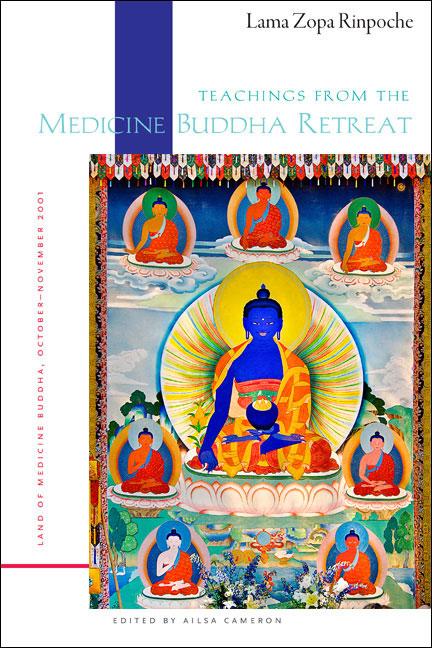Kyabje Zopa Rinpoche gave the teachings in this book during a Medicine Buddha retreat held at Land of Medicine Buddha in Soquel, California, from October 26 to November 17, 2001. Having himself recently completed a Medicine Buddha retreat, Rinpoche began by giving a Medicine Buddha great initiation on October 27 and 28. Rinpoche commuted from his nearby home in Aptos almost daily for the duration of the retreat, attending the final retreat session most days, with the teachings generally finishing in the early hours of the morning after recitation of various protector prayers and extensive dedications. The days began with Combined Jorchö and Lama Chöpa Puja, which Rinpoche attended three times.1
With the 9/11 terrorist attacks on the World Trade Center and elsewhere still painfully fresh, Rinpoche emphasized the urgent need for and benefits of Medicine Buddha practice and the need for compassion for Osama bin Laden and other terrorists, and shared the details of his open letter to President Bush about how to avert war and other disasters. There are numerous references to the war in Afghanistan, missiles and other weapons, and world economic problems. However, Rinpoche also gave detailed, invaluable teachings on emptiness, focusing especially on identifying the ignorance that is the root of samsara and of all suffering and on how to eliminate it. Rinpoche also covered a myriad of other subjects, including making extensive offerings, the nature of anger and desire, rejoicing, generating bodhicitta, the four immeasurable thoughts and ritual practice. As Rinpoche explains, “My stories are like a spider’s web, with one strand connected here and another one connected there.” There are strands that connect teachings, for example, to stories of the great yogis Serkong Dorje Chang, Gen Jampa Wangdu and Geshe Lama Konchog and of Rinpoche’s childhood in Solu Khumbu.
These are edited transcripts of the teachings given during the retreat. Unfortunately, since one audiotape was lost, most of the advice on preparing for the retreat is missing. Also, because the recording of sessions was not continuous, there are some gaps in the teachings and sudden jumps to new topics. In the eighteenth discourse, the replies in the discussion about what determines whether an action is virtuous or nonvirtuous were inaudible, but Rinpoche’s responses in the one-sided debate have been retained.
When talking about the benefits of Medicine Buddha practice, Rinpoche was usually translating directly from sutra sources, with the quotations from the sutras often hard to separate from Rinpoche’s commentary to them. It would be safest to regard the indented quotations as paraphrases rather than word-by-word translations of the sutra texts.
My heartfelt thanks to Rinpoche for his kindness and patience in giving the rich teachings in this book—and in the long wait for their publication; to all the LMB staff who organized and supported the retreat; to Ven. René Feusi and Ven. Sarah Thresher for leading the retreat sessions; to Claire Atkins for her continued generous support; to Nick Ribush and everyone else at Lama Yeshe Wisdom Archive for helping to make these teachings available; to the indefatigable Su Hung for transcribing all fortyseven audio tapes; and to Ven. Lozang Zopa for his assistance with Tibetan terms and technical points.
I apologize for any errors of omission or commission in the editing of this book. Any merit created in the production of this book is dedicated to the long lives, good health and continued teaching of Kyabje Zopa Rinpoche, His Holiness the Dalai Lama and all other perfect, pure gurus.
Notes
1 The Medicine Buddha sadhana used in the retreat was not a final translation and is not reproduced here. The Medicine Buddha puja commonly done in FPMT centers can be found in the FPMT Catalogue. [Return to text]































